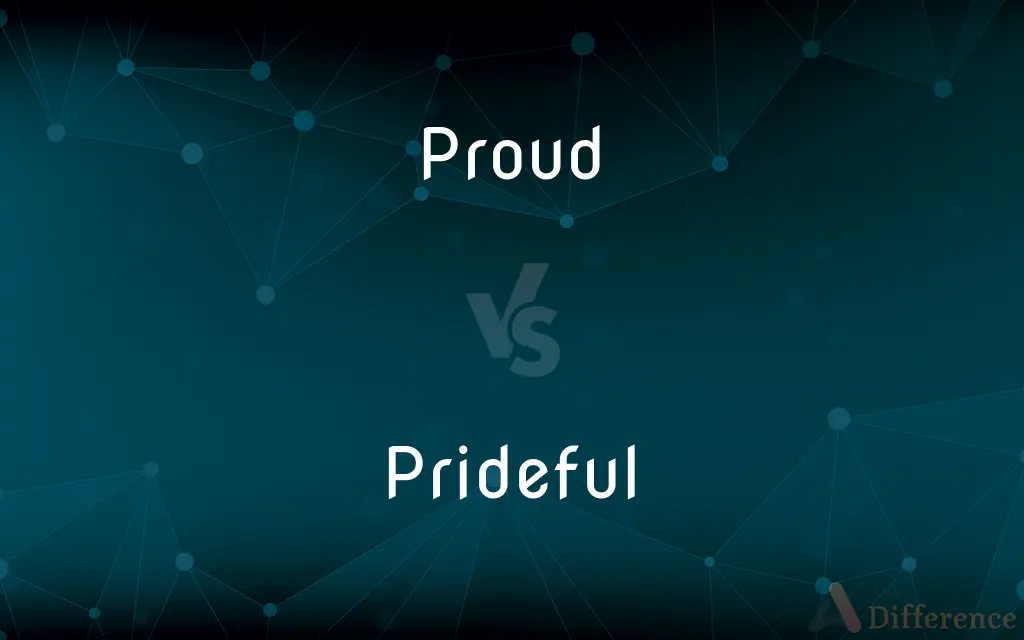Proud vs. Prideful — What's the Difference?
By Fiza Rafique & Urooj Arif — Updated on April 1, 2024
Proud connotes a positive feeling of self-respect, while prideful implies arrogance or excessive self-esteem.

Difference Between Proud and Prideful
Table of Contents
ADVERTISEMENT
Key Differences
Being proud generally refers to a justified sense of satisfaction or pleasure in one's achievements, qualities, or associations, suggesting a healthy level of self-esteem and self-respect. It can enhance an individual's confidence and is often expressed in a way that acknowledges the contributions of others. On the other hand, being prideful is typically seen in a negative light, indicating an excessive or overinflated sense of one's importance, abilities, or achievements. Prideful behavior often disregards or diminishes the value and contributions of others, leading to arrogance and a lack of humility.
While pride can serve as a motivational force, encouraging individuals to strive for excellence and maintain their integrity, pridefulness can isolate and hinder personal growth. Pride, when balanced, fosters a sense of accomplishment and belonging, contributing positively to one's mental health and interpersonal relationships. Conversely, pridefulness can create barriers to understanding and compassion, as it is rooted in an overemphasis on self over others.
In social contexts, expressing pride is usually acceptable and encouraged, especially when it comes to personal achievements, cultural heritage, or familial connections. It's a way to celebrate individual and collective successes without overshadowing others. However, pridefulness can be off-putting, as it often manifests in dismissive or superior attitudes, making it challenging to form genuine connections or work effectively in teams.
The distinction also extends to how others perceive an individual's achievements and character. Proud individuals are often admired and respected for their accomplishments and the manner in which they carry themselves, which is characterized by gratitude and humility. In contrast, prideful individuals might be viewed with skepticism or disapproval due to their tendency to overshadow or belittle others and their achievements.
Understanding the difference between being proud and being prideful is crucial for personal development and healthy relationships. While pride can be a source of strength and motivation, maintaining humility helps ensure that this pride does not morph into harmful pridefulness, preserving respect for oneself and others.
ADVERTISEMENT
Comparison Chart
Definition
Satisfaction in achievements
Excessive self-esteem
Connotation
Positive, healthy
Negative, arrogant
Impact on Self
Enhances confidence
Hinders personal growth
Impact on Others
Encourages, acknowledges
Isolates, disregards
Social Perception
Admired, respectful
Off-putting, skeptical
Compare with Definitions
Proud
Feeling of pleasure in achievements.
She felt proud of her team's hard work.
Prideful
Arrogance or overconfidence.
His prideful dismissal of advice led to mistakes.
Proud
Healthy self-esteem.
Being proud of personal growth reflects healthy self-esteem.
Prideful
Excessive self-esteem.
Her prideful attitude made teamwork difficult.
Proud
Reflecting dignity or self-respect.
He carried himself with a proud demeanor.
Prideful
Overemphasis on self.
Prideful individuals often overlook others' contributions.
Proud
Expressing satisfaction in connections.
They are proud of their cultural heritage.
Prideful
Lack of humility.
Despite his achievements, his prideful demeanor lacked gratitude.
Proud
Acknowledging others' roles.
He was proud to credit his mentor for his success.
Prideful
Detriment to relationships.
A prideful nature can alienate friends and colleagues.
Proud
Feeling deep pleasure or satisfaction as a result of one's own achievements, qualities, or possessions or those of someone with whom one is closely associated
A proud grandma of three boys
She got nine passes and he was so proud of her
Prideful
Having an excessively high opinion of oneself
A stern and prideful schoolmaster
Proud
Having or showing a high or excessively high opinion of oneself or one's importance
He was a proud, arrogant man
Prideful
Arrogant; disdainful.
Proud
Slightly projecting from a surface
Balls standing proud of the fabric
Prideful
Highly pleased; elated.
Proud
Feeling pleasurable satisfaction over an act, possession, quality, or relationship by which one measures one's stature or self-worth
Proud of one's child.
Proud to serve one's country.
Prideful
Full of pride; haughty, arrogant.
Proud
Occasioning or being a reason for pride
A proud moment when she received her diploma.
Prideful
Full of pride; haughty.
Proud
Feeling or showing justifiable self-respect
Too proud to beg.
Prideful
Having or showing arrogant superiority to and disdain of those one views as unworthy;
Some economists are disdainful of their colleagues in other social disciplines
Haughty aristocrats
His lordly manners were offensive
Walked with a prideful swagger
Very sniffy about breaches of etiquette
His mother eyed my clothes with a supercilious air
Shaggy supercilious camels
A more swaggering mood than usual
Proud
Filled with or showing excessive self-esteem
A proud and haughty aristocrat.
Prideful
Joyful and proud especially because of triumph or success;
Rejoicing crowds filled the streets on VJ Day
A triumphal success
A triumphant shout
Proud
Of great dignity; honored
A proud name.
Proud
Majestic; magnificent
Proud alpine peaks.
Proud
Spirited. Used of an animal
Proud steeds.
Proud
Feeling honoured (by something); feeling happy or satisfied about an event or fact; gratified.
I am proud of Sivu’s schoolwork.
Proud
That makes one feel proud (of something one did)
That was not the proudest thing I did but I can’t deny it.
Proud
Possessed of a due sense of what one deserves or is worth.
I was too proud to apologise.
Proud
Having too high an opinion of oneself; arrogant, supercilious.
Proud
Generating a sense of pride; being a cause for pride.
It was a proud day when we finally won the championship.
Proud
(Of things) standing upwards as in the manner of a proud person; stately or majestic.
Proud
Standing out or raised; swollen.
After it had healed, the scar tissue stood proud of his flesh.
The weld was still a bit proud of the panel, so she ground it down flush.
Proud
(obsolete) Brave, valiant; gallant.
Proud
Having a feeling of high self-respect or self-esteem; exulting (in); elated; - often with of; as, proud of one's country.
Are we proud men proud of being proud ?
Proud
Giving reason or occasion for pride or self-gratulation; worthy of admiration; grand; splendid; magnificent; admirable; ostentatious.
Till tower, and dome, and bridge-way proudAre mantled with a golden cloud.
Proud
Feeling self-respect or pleasure in something by which you measure your self-worth; or being a reason for pride;
Proud parents
Proud of his accomplishments
A proud moment
Proud to serve his country
A proud name
Proud princes
Proud
Having or displaying great dignity or nobility;
A gallant pageant
Lofty ships
Majestic cities
Proud alpine peaks
Common Curiosities
How can pridefulness be harmful?
Pridefulness can lead to arrogance, isolating individuals from others and hindering personal growth.
Why is pridefulness viewed negatively?
Pridefulness is seen negatively because it often involves excessive self-esteem and disregards others.
Can pride have a positive impact?
Absolutely, pride can motivate individuals to achieve and maintain integrity.
How can one avoid becoming prideful?
Maintaining humility and acknowledging the contributions of others can prevent pride from becoming pridefulness.
What's the difference in expressing pride vs. pridefulness?
Expressing pride is usually about sharing achievements respectfully, whereas pridefulness may come off as boastful or dismissive.
Is being proud of others the same as personal pride?
Feeling proud of others still reflects a positive sentiment but focuses on external achievements rather than personal ones.
What does it mean to be proud?
Being proud refers to a positive sense of satisfaction with oneself, one's achievements, or associations.
Is it okay to feel proud?
Yes, feeling proud in a balanced way is healthy and contributes positively to self-esteem.
How does society view proud vs. prideful individuals?
Society tends to admire proud individuals for their achievements and humility, whereas prideful people might be viewed with skepticism.
Can pridefulness affect teamwork?
Yes, a prideful attitude can make collaboration difficult and strain team dynamics.
How do pride and pridefulness affect leadership?
Proud leaders inspire and uplift, while prideful leaders may alienate their team and inhibit growth.
What is the role of acknowledgment in being proud?
Acknowledgment of one’s own efforts and those of others is key to experiencing and expressing pride healthily.
How can one transform pridefulness into positive pride?
Reflecting on one’s attitudes and valuing others’ contributions can help shift from pridefulness to healthy pride.
What role does culture play in perceptions of pride?
Cultural values can influence how pride and pridefulness are perceived, with some cultures placing more emphasis on humility.
Can pridefulness be mistaken for confidence?
Sometimes, but confidence is rooted in realistic self-assessment, unlike the exaggerated self-view of pridefulness.
Share Your Discovery

Previous Comparison
Buried vs. Interred
Next Comparison
Accident vs. FlukeAuthor Spotlight
Written by
Fiza RafiqueFiza Rafique is a skilled content writer at AskDifference.com, where she meticulously refines and enhances written pieces. Drawing from her vast editorial expertise, Fiza ensures clarity, accuracy, and precision in every article. Passionate about language, she continually seeks to elevate the quality of content for readers worldwide.
Co-written by
Urooj ArifUrooj is a skilled content writer at Ask Difference, known for her exceptional ability to simplify complex topics into engaging and informative content. With a passion for research and a flair for clear, concise writing, she consistently delivers articles that resonate with our diverse audience.














































